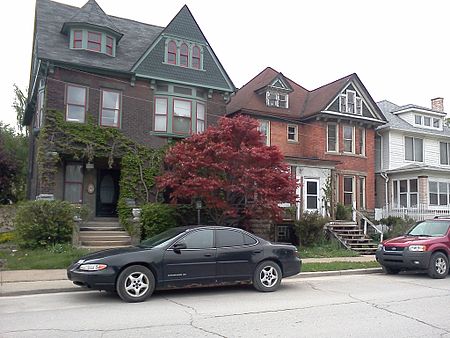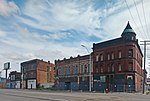Hubbard Farms, Detroit

Hubbard Farms is a neighborhood located in Detroit, Michigan. It is located on one of the old plots which used to be a ribbon farm along the Detroit River. It is bound by Clark St to the west, W Vernor Hwy to the north, W Grand Blvd to the east, and W Lafayette Blvd to the south. In 1993, it received its official historic district designation.Dating back before French fur traders colonized the Detroit area, the district was used by the Pottawatomie tribes as a local burial ground. After the area was colonized by the French in the 1700s, the land was granted to Robert Navarre, the royal notary at Fort Ponchartrain, who then split the land grant into five ribbon farms along the Detroit River. After the end of the War of 1812, many English immigrants in the area began to buy subplots and establish smaller farms. One of the first U.S. citizens to own land in the area was Whitmore Knagg, a military interpreter and frontier Indian fighter. He then sold some of this property to the Hubbard family in 1835. The district was named after Bela Hubbard, a prominent local geologist, lumber baron, land agent, lawyer, farmer, historian and civic leader. In the 1830s, Bela made an early contribution to archaeology: as he surveyed the property, he realized that the area had once been a Pottawatomie village and burial ground. He conducted an excavation and discovered many tribal artifacts. When the State of Michigan was founded in 1837, Bela was named Michigan's first assistant geologist. Once the Civil War came to an end, Detroit experienced an influx of manufacturing jobs, which created a housing need. Hubbard Farms soon became home to executives and workers such as David Scotten, the owner of the Hiawatha Tobacco Works factory. In 1885, the district was incorporated into Detroit. Much of the architecture in the community was designed and built between the 1880s and the World War I. Although the area has an overall Victorian feel, the time range for construction and the affluence of the area is reflected in diverse architectural styles and choices. The district features homes that display Romanesque, Colonial Revival, Beaux Arts, Federalist and even Italianate designs.
Excerpt from the Wikipedia article Hubbard Farms, Detroit (License: CC BY-SA 3.0, Authors, Images).Hubbard Farms, Detroit
Hubbard Street, Detroit Southwest Detroit
Geographical coordinates (GPS) Address Nearby Places Show on map
Geographical coordinates (GPS)
| Latitude | Longitude |
|---|---|
| N 42.319 ° | E -83.09 ° |
Address
Hubbard Street 1457
48209 Detroit, Southwest Detroit
Michigan, United States
Open on Google Maps






